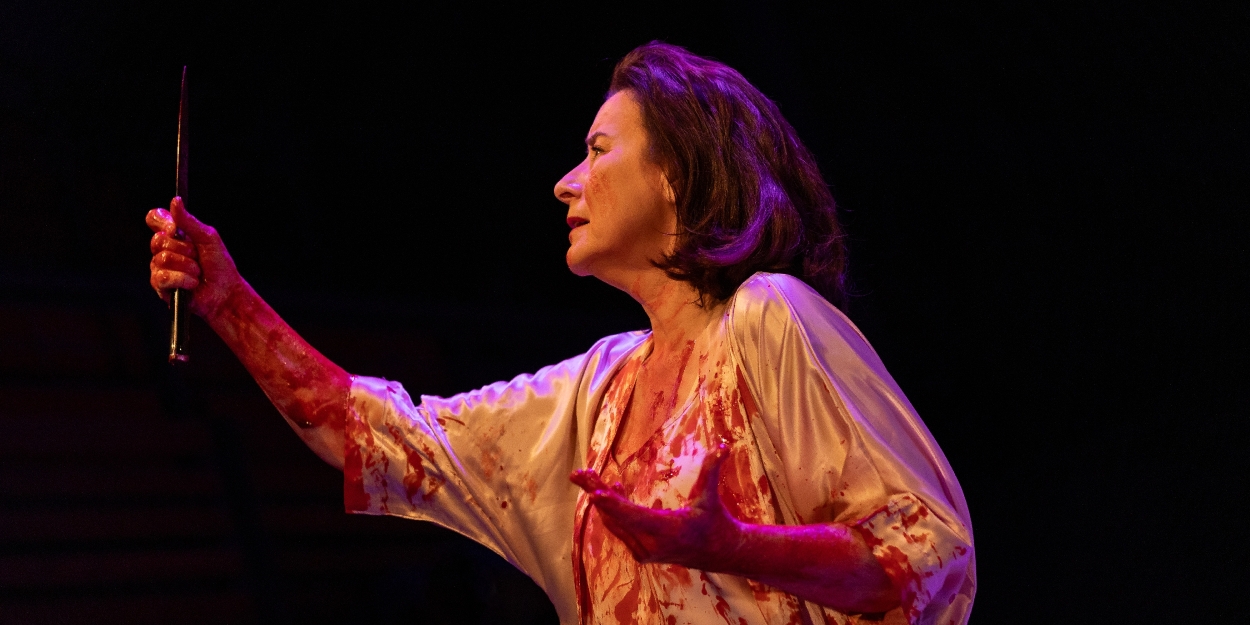Review: The Atreides Are Us in THE ORESTEIA at Chesapeake Shakespeare Company
A Modern Interpretation of the Classic Greek Trilogy

We have met the Atreides, and they are us. At least this is so in Chesapeake Shakespeare Company’s new production of Ellen McLaughlin’s modern rendering of The Oresteia, Greek playwright Aeschylus’ three-play saga of tit-for-tat revenge killings. A performance of that trilogy, in its original 458-BCE production, would have taken all day, but in McLaughlin’s trimmed-down version runs little more than two hours. In that abbreviated span, the travails of the House of Atreus are polished down to a gem-like miniature metaphor for some of modern humanity’s largest and worst problems.
We constantly read headlines from wars of ancestral grudges, in which each side can claim ancient rights to justify each daily outrage it perpetrates. We also seem to find ourselves adrift in a world of so-called honor culture, in which those who have been wronged or whose social norms have been breached are expected to avenge themselves and vindicate those norms through blood. And yet the killings themselves violate other norms. How do we resolve the resulting dilemmas? Aeschylus and McLaughlin are on hand with some instructive tales to help us think, and, more important, feel our way through to answers.
I include both the original dramatist and the translator/abridger in this comment because what we are witnessing is not a mere translation and abridgment. Not for nothing is McLaughlin listed on the program as “The Playwright.” Many of Aeschylus’ plot-lines and characters have been tossed aside, and the all-important resolution of the plot and the disputes changed; for the details, I refer the reader to the invaluable discussion by New York Times chief drama critics Jesse Green in his review of the original production of this translation, in Washington in 2019. What remains, however, is the dawning recognition that (in an aphorism sometimes attributed to Gandhi) “an eye for an eye makes the whole world blind.”
Heaven knows the characters try hard to live by the original “eye for an eye” principle (articulated in the Judeo-Christian world in Exodus 21:24) before the futility of that effort becomes fully apparent. As Aeschylus’ audience would have known, goddess Artemis wrought revenge on King Agamemnon (Stephen Patrick Martin) for an offense against her by stilling the winds necessary to move Agamemnon’s fleet to Troy, delaying Agamemnon’s armies from doing their 10-year stint in the Trojan War. In this bit of divine blackmail, the winds would only be restored if Agamemnon sacrificed his daughter Iphigenia (Charlotte Molitoris). We, along with the retainers in the royal household (a group refashioned by McLaughlin from the Chorus) witness the murder.
Then, of course, after the Trojan War winds to its successful (from the Greek perspective) conclusion, the revenge is itself revenged, when Agamemnon’s wife Clytemnestra (Isabelle Anderson) slays both the returning Agamemnon and Cassandra (Emily Erickson), a former Trojan princess now in enforced concubinage to Agamemnon, the former because he slew Iphigenia, the latter just because (no explanations are required when the matron knocks off the husband’s new squeeze, no matter how involuntary the latter’s involvement). So should the revenge for the revenge in turn be avenged? The characters tasked with doing that, if it is to be done, are the two remaining children of Agamemnon and Clytemnestra: their son Orestes (Isaiah Harvey) and the now-grown youngest sister Electra (Lizzi Albert). Unlike Clytemnestra, Orestes is not infected by the spirit of revenge, but by a sense, under the code of honor prevailing in his world, a code given voice by the Furies in his mind, that the fitting and proper response is to kill the killer, even if the killer is his own mother.
But of course, if he does so, what judgment will lie upon him, who will pass it, and what form will it take? The answers to these questions, as suggested by McLaughlin’s script, are intertwined. The servants/Chorus become what amounts to a jury, bringing their common sense and their life stories to an impossible-seeming task. The house of Atreus, in effect, becomes the whole world, and the servants, left masterless, become its residents and masters. Like the surviving characters in Into the Woods, they must, in the absence of guidance, “decide what’s right, … decide what’s good.” But if the action of the play has taught them anything, it’s that the rules they had previously learned are not adequate to any judgment they may pass upon Orestes and Electra. Judgment may not even be a relevant term to their encounter with this history. That encounter, it seems, goes deeper than mere judgment.
There are great depths here, and great wisdom, and McLoughlin’s handiwork and that of Chesapeake Shakespeare convey them well. It is good to see a Shakespeare-oriented theater applying its tools and insights to other material from time to time, particularly classical material that is not often produced in these parts.
That said, there are some things I would have liked to have seen done differently with the direction. As much universality as lies within the play, it still harks from and evokes another world and theatrical practice, in which passions were played up and displayed. This Clytemnestra, however, is performed in a modern way, with modern moments of restraint, frequently belying the intensity one would otherwise expect. Much of the time she could be a New York society matron, outwardly rolling with punches she cannot avoid (like the Truman Capote “swans” currently headlining a Hulu series), and suppressing and distancing herself at least for a while from her feelings of grief and rage. Even after her turn, that is, at the moment she arrives hauling the very embodiments of her wrath, Cassandra and Agamenon’s corpses, and kicking one, tossing the other, into the grave, she still seems to be holding her feelings somewhat at arm’s length. Cassandra is also played a bit along these lines, especially when, using her prophetic gifts, she foresees her own impending death (and one can almost envision her rolling her eyes and saying “what-ev-er”), but the modern distancing is not so pronounced as with Clytemnestra. These portrayals stand in opposition to the presentation of Orestes wrestling frankly and without reserve against the conflicting passions that impel and arise from his own quest for revenge. The way Orestes does it seems closer to the spirit the material calls for.
That said, I will turn around and give the director, Lise Bruneau, credit for where she does much the same thing with the Chorus, who come across as ordinary folks, with an ordinary variety of emotions, ordinarily expressed. But there it makes sense; these characters are the audience’s – including the modern audience’s – stand-ins. Their costumes, by Kristina Lambdin, tell us so, as they hark from varied eras, including perhaps ours (and bespeak varied servitorial roles). Their perplexity, at the end, is ours, and their reactions can be ours too.
Those few reservations aside, this is a pretty much perfect performance, beautifully staged. In addition to Lambdin’s costumes, I was impressed with the sound design by Sarah O’Halloran. The set, by Kathryn Kawecki, honors the historical arrangement of the Athenian stage as much as a modern thrust stage can do, with a commodious area for the Chorus downstage and an elevated house, a skene, with prominent doors in front, to articulate, and screen as much as reveal the actions of the principal characters. It all works beautifully. So this production will keep your eyes and your ears, as well as your soul, engaged.
Here’s hoping Chesapeake Shakespeare will get around to doing another Greek drama sometime soon. This one is a heck of a show.
The Oresteia, freely adapted from Aeschylus by Ellen McLaughlin, directed by Lise Bruneau, presented by the Chesapeake Shakespeare Company, through March 10, at 7 South Calvert Street, Baltimore, MD 21202. Tickets from $55, with youth tickets from $28, at 410-244-8570, or ChesShakes.com/Oresteia. Violence and bloodshed, including the onstage murder of a child.
Photo credit: Kiirstn Pagan Photography.
Comments
Videos
